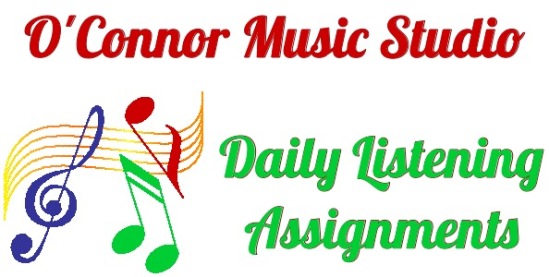Be sure your student reads and listens to Today’s Daily Listening Assignment
• 1618 ~ Christian de Placker, Composer
• 1708 ~ Johann Gottlieb Janitsch, Composer
• 1717 ~ Johann Wenzel Anton Stamitz, Bohemian violist, conductor and composer
• 1730 ~ Jean-Baptiste Loeillet, Composer, died at the age of 49
• 1747 ~ Alessandro Marcello, Composer, died at the age of 77
• 1759 ~ Charles-Joseph-Balthazar Sohier, Composer, died at the age of 31
• 1762 ~ Johann Ernst Eberlin, Composer, died at the age of 60
• 1766 ~ Edmund Weber, Composer
• 1782 ~ John Bray, Composer
• 1825 ~ Ferdinand David (1810) Violist and composer
• 1815 ~ John William Glover, Composer
• 1822 ~ John Bray, Composer, died on his 40th birthday
• 1825 ~ Gioacchino Rossini’s “Il viaggio a Reims,” premiered
• 1842 ~ Carl Johann Adam Zeller, Composer
• 1843 ~ Charles Edouard Lefebvre, Composer
• 1854 ~ Alfredo Catalani, Italian composer
• 1885 ~ Stevan Hristic, Composer
• 1886 ~ Robert Herberigs, Flemish Composer and writer
• 1898 ~ Paul Muller-Zurich, Composer
• 1902 ~ Guy (Gaetano) Lombardo, Canadian-born American bandleader with The Royal Canadians: “The most beautiful music this side of heaven.”
• 1904 ~ Balis Dvarionas, Composer
• 1905 ~ Taneli Kuusisto, Composer
• 1910 ~ Edwin Gerschefski, Composer
• 1910 ~ Father’s Day was observed for the first time at Spokane, Wash., at the request of the the local YMCA and the Spokane Ministerial Association to earmark a Sunday to “honor thy father.” The idea originated in the mind of a Ms. John Bruce Dodd, a local housewife who was inspired by her admiration for the great job her father, William Smart, had done in raising his 6 children after his wife’s untimely and early death.
• 1912 ~ Jerry Jerome, American saxophonist
• 1913 ~ Sergey Ivanovich Taneyev, Russian Composer, died at the age of 58
• 1926 ~ DeFord Bailey was the first black to perform on Nashville’s Grand Ole Opry
• 1927 ~ Karel Kupka, Composer
• 1930 ~ Jul Levi, Composer
• 1932 ~ First concert performed in San Francisco’s Stern Grove
• 1936 ~ Tommy DeVito, Singer with The Four Seasons
• 1939 ~ Al Wilson, Musician, drummer, singer with Show and Tell
• 1940 ~ Maurice Jaubert, Composer, died at the age of 40
• 1942 ~ Spanky (Elaine) McFarlane, Singer with Spanky and Our Gang
• 1943 ~ Shiek Of Araby by Spike Jones & City Slickers peaked at #19
• 1951 ~ Ann Wilson, Singer with Heart
• 1953 ~ Larry Dunn, Musician, keyboards with Earth, Wind & Fire
• 1956 ~ Doug Stone, Singer
• 1960 ~ Loretta Lynn recorded Honky Tonk Girl
• 1961 ~ Little Egypt (Ying-Yang) by Coasters peaked at #23
• 1962 ~ Paula Abdul, Singer
• 1965 ~ I Can’t Help Myself, by The Four Tops, topped the pop and R&B charts. The Tops, who had no personnel changes in their more than 35 years together were inducted into the Rock and Roll Hall of Fame in 1990.
• 1966 ~ Marjan Kozina, Composer, died at the age of 59
• 1984 ~ Wladimir Rudolfovich Vogel, Composer, died at the age of 88
• 1988 ~ Zdenek Blazek, Composer, died at the age of 83
• 1994 ~ “She Loves Me” closed at Atkinson Theater New York City after 294 performances
• 1994 ~ “Twilight – Los Angeles 1992” closed at Cort New York City after 72 performances
• 1995 ~ Murray Dickie, Opera singer/director, died at the age of 71
• 1996 ~ Alan Ande Anderson, Opera director, died at the age of 78
• 1996 ~ Vivian Ellis, Composer, died at the age of 91
• 1997 ~ Bobby Helms, singer (Jingle Bell Rock), died at the age of 63
• 1997 ~ “Forever Tango!” opened at Walter Kerr Theater New York City







